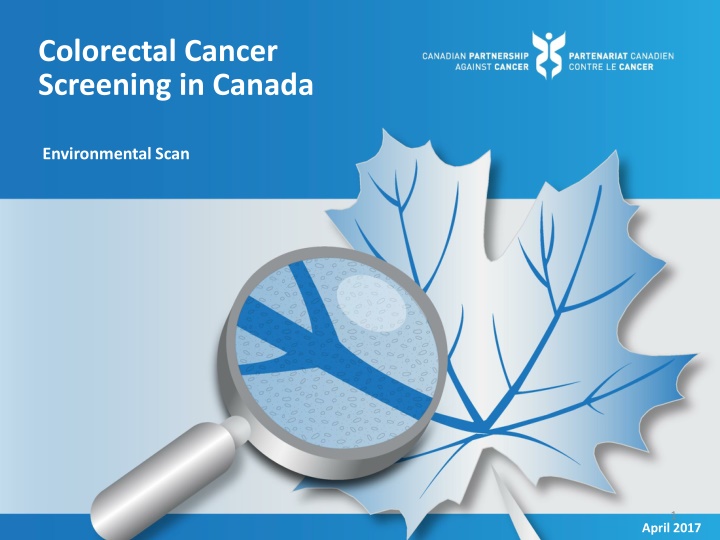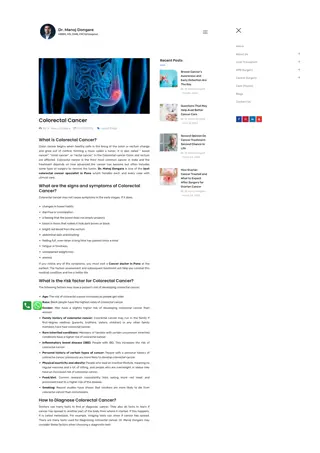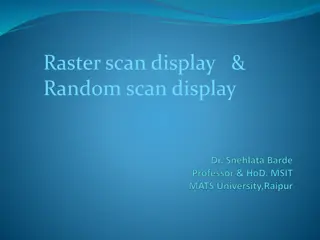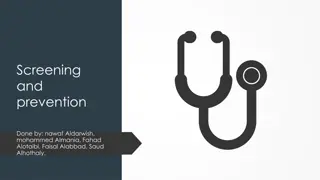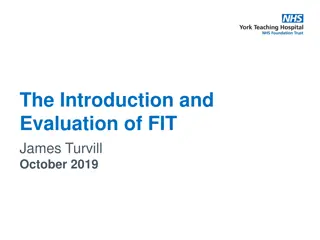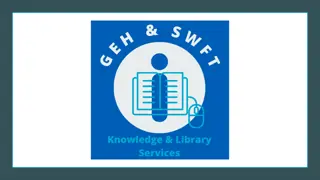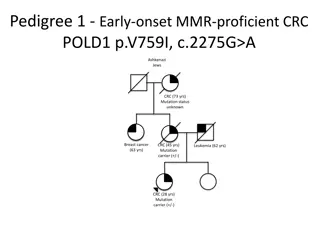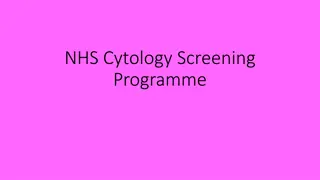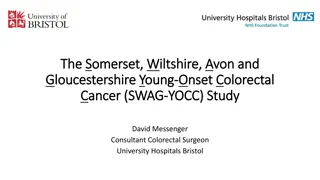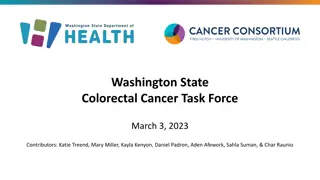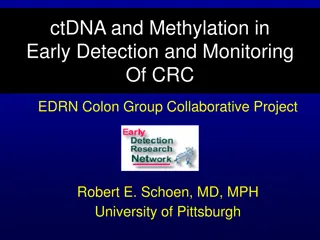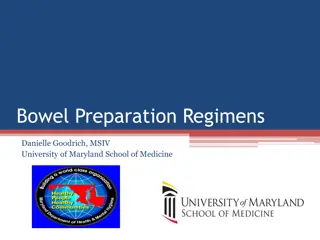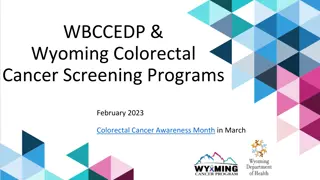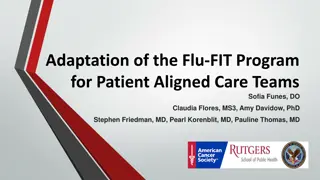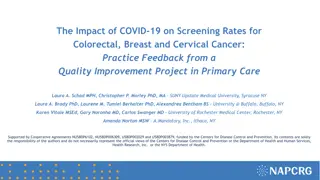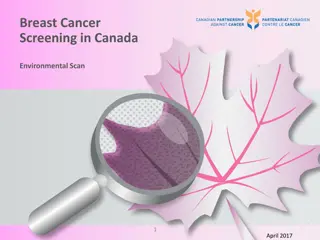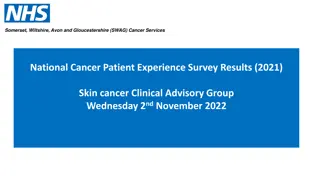Colorectal Cancer Screening in Canada: Environmental Scan 1 April 2017
The Canadian Partnership Against Cancer compiles annual data on national, provincial, and territorial colorectal cancer screening guidelines and strategies. This summary provides insights into organized screening programs, guidelines, recruitment strategies, fecal testing information, diagnostic follow-up protocols, and more. The document outlines the status of colorectal cancer screening programs, highlighting implementation progress across provinces and territories, screening pathways, guidelines, and recommendations for at-risk individuals.
Download Presentation

Please find below an Image/Link to download the presentation.
The content on the website is provided AS IS for your information and personal use only. It may not be sold, licensed, or shared on other websites without obtaining consent from the author.If you encounter any issues during the download, it is possible that the publisher has removed the file from their server.
You are allowed to download the files provided on this website for personal or commercial use, subject to the condition that they are used lawfully. All files are the property of their respective owners.
The content on the website is provided AS IS for your information and personal use only. It may not be sold, licensed, or shared on other websites without obtaining consent from the author.
E N D
Presentation Transcript
Colorectal Cancer Screening in Canada Environmental Scan 1 April 2017
Background The Canadian Partnership Against Cancer collects information annually on national, provincial and territorial colorectal cancer screening guidelines, strategies and activities. This scan summarizes the data collected from provincial and territorial screening programs and is intended to provide information on policy and practice. 2
Outline Colorectal Cancer Screening Programs and Guidelines Colorectal Cancer Screening Pathway Colorectal Cancer Screening Program Status Canadian Task Force on Preventive Health Care Guidelines Provincial and Territorial Screening Guidelines Recruitment and Retention Strategies for Colorectal Cancer Screening Fecal Testing Information Diagnostic Follow-Up After an Abnormal Result Screening Recommendations for Individuals at Increased Risk 3
Colorectal Cancer Screening Programs and Guidelines Organized colorectal cancer screening programs are available in Canada to individuals who are asymptomatic (no signs or symptoms of colorectal cancer present) and at average risk for colorectal cancer. Currently, there are organized colorectal cancer screening programs in all provinces and Yukon. There are no colorectal cancer screening programs available in Northwest Territories. Plans are underway to develop programs in Nunavut. Where organized screening programs are not available, screening services may be provided opportunistically by a primary care provider. 4
Colorectal Cancer Screening Programs and Guidelines - Highlights Colorectal Cancer Screening Program Status (refer to slide #7-8) Eight provinces and one territory have fully implemented organized colorectal cancer screening programs across Canada. These programs started in March 2007 (Alberta) to December 2016 (Yukon). The colorectal cancer screening program in New Brunswick was first implemented in November 2014 and covers 60% of the target population. Quebec has also begun implementation of a colorectal cancer screening program. Currently, there is no organized colorectal cancer screening program available in the Northwest Territories and plans are underway to develop a program in Nunavut. Provincial and Territorial Colorectal Cancer Screening Guidelines (refer to slide #11-12) Provinces and territories screen asymptomatic individuals at average risk between the ages of 50 and 74-75 every 1-2 years with a fecal occult blood test (either guaiac or FIT). Most provinces and territories have a two year interval, with the exception of Northwest Territories and Alberta, which have a one to two year interval. 5
Colorectal Cancer Screening Pathway Adapted from: Canadian Partnership Against Cancer. Colorectal Cancer Screening in Canada: Program Performance Results Report, January 2009 December 2011. Toronto: Canadian Partnership Against Cancer; December 2013 6
Colorectal Cancer Screening Program Status Program Start Date Program Status (as of Jan 1, 2017) Program Name Agency responsible for Program Administration Nunavut (NU) Currently no organized screening program but plans are underway Northwest Territories (NT) No organized screening program available Yukon (YK) December 2016 Full program, territory wide ColonCheck Yukon Government of Yukon Health and Social Services British Columbia (BC) 2009 pilot, November 2013 province wide Full program, province wide Colon Screening Program BC Cancer Agency Alberta (AB) March 2007 Full program, province wide Alberta Colorectal Cancer Screening Program (ACRCSP) Alberta Health Services Saskatchewan (SK) January 20, 2009 Full program, province wide Screening Program for Colorectal Cancer Saskatchewan Cancer Agency Manitoba (MB) April 2007 Full program, province wide ColonCheck CancerCare Manitoba Ontario (ON) March 2008 Full program, province- wide ColonCancerCheck Cancer Care Ontario 7
Colorectal Cancer Screening Program Status, cont d Program Start Date Program Status (as of Jan 1, 2017) Program Name Agency responsible for Program Administration Quebec (QC) N/A In implementation (opportunistic screening available through physician) Programme qu b cois de d pistage du cancer colorectal (PQDCCR) Ministry of Health and Social Services New Brunswick (NB) November 2014 Partial program, inviting 60% of target population and expanding New Brunswick Colon Cancer Screening Program New Brunswick Cancer Network (NB Department of Health) Nova Scotia (NS) April 1, 2009 Full program, province wide Colon Cancer Prevention Program Cancer Care Nova Scotia, Nova Scotia Health Authority Program of Care for Cancer Prince Edward Island (PE) April 2011 Full program, province wide PEI Colorectal Cancer Screening Program Health PEI Eastern Health, Cancer Care Program Newfoundland and Labrador (NL) March 19, 2010 Full program, province wide Newfoundland and Labrador Colon Cancer Screening Program N/A = Not applicable 8
Colorectal Cancer Screening Program Availability 9
Canadian Task Force on Preventive Health Care Guidelines (2016) The Canadian Task Force on Preventive Health Care (2016) recommends individuals at average risk, aged 50-74, screen for colorectal cancer with an FOBT [either fecal test guaiac (FTg) or FIT] every 2 years or flexible sigmoidoscopy every 10 years. Additionally, the Canadian Task Force on Preventive Health Care does not recommend the following: Screening individuals aged 75 and over for colorectal cancer Using colonoscopy as a screening test for colorectal cancer For more information please visit: http://canadiantaskforce.ca/ 10
Provincial and Territorial Colorectal Cancer Screening Guidelines For asymptomatic individuals at average risk: Start Age Interval Stop Age Primary Screening Test (FTg, FIT or both; flexible sigmoidoscopy) NU* 50 Every 2 years 74 Currently under review NT* 50 Every 1-2 years 74 FIT YK 50 Every 2 years 74 FIT BC 50 Every 2 years 74 FIT AB 50 Every 1-2 years 75 FIT SK 50 Every 2 years 75 FIT MB 50 Every 2 years 75 FTg ON 50 Every 2 years 74 FTg** *There is no organized colorectal cancer screening program available in Nunavut and the Northwest Territories (NT). Responses refer to opportunistic colorectal cancer screening **In ON, people aged 50 to 74 without a family history of colorectal cancer who choose to be screened with flexible sigmoidoscopy should be screened every 10 years. 11
Provincial and Territorial Colorectal Cancer Screening Guidelines, cont d For asymptomatic individuals at average risk: Start Age Interval Stop Age Primary Screening Test (FTg, FIT or both; flexible sigmoidoscopy) QC 50 Every 2 years 74 FIT NB 50 Every 2 years 74 FIT NS 50 Every 2 years 74 FIT PE 50 Every 2 years 74 FIT NL 50 Every 2 years 74 FIT 12
Recruitment and Retention Strategies for Colorectal Cancer Screening Organized colorectal cancer screening programs administer recruitment, reminder and promotional strategies to invite eligible individuals to screen (as per guidelines). Recruitment strategies and methods vary across the country and may include: physician or self- referral or mailed letters. Reminders in the form of letters, phone calls or emails, may be sent to eligible individuals to ensure the highest participation rate is achieved for the screening program. 13
Recruitment and Retention Strategies for Colorectal Cancer Screening - Highlights Colorectal Cancer Screening Recruitment and Retention Methods (refer to slide #15-18) Many screening programs recruit individuals to screen for colorectal cancer by offering fecal immunochemical testing (FIT). There are various recruitment methods being implemented across the country such that many provinces require a referral from a physician prior to distributing a FIT kit; others distribute the FIT kit to eligible individuals with a mailed invitation letter or after the letter has been sent; and clients can obtain FIT kits by directly contacting some screening programs. Examples of promotional strategies for colorectal cancer screening delivered by provinces include: promotional information via program website or program related correspondences (e.g. flyers distributed with screening result letters), educational resources for the public and healthcare providers, marketing campaigns (e.g. Colon Cancer Month), media, newsletters, as well as radio and print advertising (e.g. posters). Many provincial/territorial colorectal cancer screening programs send a recall letter two years after a client receives a normal result. 14
Colorectal Cancer Screening Recruitment and Retention Methods What are the recruitment and retention strategies for your colorectal cancer screening program? How are individuals recruited into the screening program? Promotional Strategy Reminder Strategy After No Reply Recall Method After Normal Result Physician Referral* Self- Self- Referral through Pharmacy With Mailed Invitation Letter (Specify if Kit is Sent with Letter) Other (Please Specify) Referral** NU Currently no organized screening program but plans are underway NT No organized screening program available YK ---- ---- ---- ---- Program website, Facebook page, promotional and educational resources for health care providers and patients; program campaign; community visits Reminder methods are being considered Recall letter sent every 2 years to primary care providers and participants due for screening BC ---- ---- ---- ---- Program website, promotional and educational resources for health care providers and patients ---- Recall letter sent every 2 years to primary care providers and participants due for screening *Physician referral: physician refers individual to the colorectal cancer screening program **Self-referral: an individual contacts the colorectal cancer screening program directly to participate in the program Self-referral through pharmacy: individuals pick-up fecal testing kit at a pharmacy ---- No information was provided at the time the data was collected 15
Colorectal Cancer Screening Recruitment and Retention Methods, cont d What are the recruitment and retention strategies for your colorectal cancer screening program? How are individuals recruited into the screening program? Promotional Strategy Reminder Strategy After No Reply Recall Method After Normal Result Physician Referral* Self- Self- Referral through Pharmacy With Mailed Invitation Letter (Specify if Kit is Sent with Letter) Other (Please Specify) Referral** (primary method) No AB No No No Program website, promotional and educational resources for health care providers and public, program marketing campaigns ---- ---- (by calling the program) (primary method) SK ---- ---- Program website, promotional and educational resources for health care providers and public, radio and print ads Reminder letter sent 9 weeks after invitation Recall letter sent every 2 years to target population (phone, email, in person, online request) (primary method) MB ---- Walk-ins from breast screening appointments Mailed letters, public advertising and events, combined screening promotion (GetChecked Manitoba), web and social media, education and events for health providers Reminder letter sent 56 days after test Recall letter sent 2 years after test is completed *Physician referral: physician refers individual to the colorectal cancer screening program **Self-referral: an individual contacts the colorectal cancer screening program directly to participate in the program Self-referral through pharmacy: individuals pick-up fecal testing kit at a pharmacy ---- No information was provided at the time the data was collected 16
Colorectal Cancer Screening Recruitment and Retention Methods, cont d What are the recruitment and retention strategies for your colorectal cancer screening program? How are individuals recruited into the screening program? Promotional Strategy Reminder Strategy After No Reply Recall Method After Normal Result Physician Referral* Self- Self- Referral through Pharmacy With Mailed Invitation Letter (Specify if Kit is Sent with Letter) Other (Please Specify) Referral** (primary method) * (for patients without a primary care provider) ON *Self-referral is available by calling Telehealth ON (for patients without a primary care provider); and via mobile services Public advertising, provider education campaigns Reminder letter sent 4 months after invitation (if no screening has taken place) Recall letter sent 2 years after test is completed QC ---- ---- ---- Public educational campaign held March 2017. Information is made available on the MSSS portal ---- Recall letter sent every 2 years to the target population (for those in the program) (opportuni- stic screening is available) (for those in the program) (invitation by program; FIT available through program) NB N/A N/A N/A ---- Promotional and educational campaigns for health care providers, professionals and public Program sends reminder letters12 weeks after initial invitation Recall letter sent 2 years from the date of last negative result *Physician referral: physician refers participant into the colorectal cancer screening program **Self-referral: an individual contacts the colorectal cancer screening program directly to participate in the program Self-referral through pharmacy: individuals pick-up fecal testing kit at a pharmacy ---- No information was provided at the time the data was collected N/A = Not applicable 17
Colorectal Cancer Screening Recruitment and Retention Methods, cont d What are the recruitment and retention strategies for your colorectal cancer screening program? How are individuals recruited into the screening program? Promotional Strategy Reminder Strategy After No Reply Recall Method After Normal Result Physician Referral* Self- Referral ** Self- Referral through Pharmacy With Mailed Invitation Letter (Specify if Kit is Sent with Letter) Other (Please Specify) (invitation letter sent at entry point (age 50 or new resident) then FIT kit follows) NS ---- ---- ---- ---- Promotional resources for public, education for health care professionals No Recall letter and FIT kit sent every 2 years (after invitation letter has been sent, individuals call to order or pick-up a FIT kit at their physician s office) PE ---- ---- Colon Cancer Month including public advertising: print, web; TV, radio. Joint flyer about screening for breast, cervical and colorectal cancer is distributed with FIT result letter ---- Recall letter sent every 2 years after FIT is completed (toll-free line) ---- Promotional resources for public (radio/print/web), media and advertising NL ---- ---- Referral through breast screening centres Reminder letter sent 8 weeks after FIT kit is mailed *Physician referral: physician refers participant into the colorectal cancer screening program **Self-referral: an individual contacts the colorectal cancer screening program directly to participate in the program Self-referral through pharmacy: individuals pick-up fecal testing kit at a pharmacy ---- No information was provided at the time the data was collected 18
Colorectal Cancer Screening Fecal Testing Information The modality commonly used as an entry level screening test for colorectal cancer is fecal testing. In Canada, a number of screening program features may differ, including type of fecal test offered (guaiac or immunochemical testing) and sampling details for the particular fecal test. 19
Colorectal Cancer Screening Fecal Testing Information - Highlights Entry Level Test: Fecal Test Guaiac (FTg) Sampling Details (refer to slide #21) There are only two provinces (Manitoba and Ontario) which currently offer fecal test guaiac (FTg) as a screening test for colorectal cancer. FTg is offered to eligible individuals every two years. In Canada, the number of labs processing the results ranges from one lab (Manitoba) to six labs (Ontario). The FTg brands include Hemoccult II SENSA (Manitoba) and Hema-screen (Ontario). Entry Level Test: Fecal Immunochemical Testing (FIT) Sampling Details (refer to slide #22-23) Eight provinces and two territories offer fecal immunochemical testing (FIT) up to every two years as a primary screening test for colorectal cancer. The most common brand for FIT in Canada is Alere (four provinces/one territory) and Polymedco (three provinces). Most provinces/territories require a single sample collection method for the FIT, whereas, one province and one territory collects two samples. The FIT cut-off value varies across Canada and ranges from 75 ng/ml (NWT) to 175 ng/ml (QC). The number of labs processing the FIT results ranges from one lab (six provinces/one territory) to five labs (one province). 20
Entry Level Test: Fecal Test Guaiac (FTg) Sampling Details Does your program offer FTg as an entry level test? If so, what are the specific sampling details for this test? Brand Name Number of Samples Over the Number of Stools (e.g. XX samples per YY stools) Number of Labs Processing Test Results NU Currently under review MB Hemoccult II SENSA 2 samples per 3 stools 1 lab ON Hema-screen 2 samples per 3 stools 6 labs (7 testing sites) 21
Entry Level Test: Fecal Immunochemical Testing (FIT) Sampling Details Does your program offer FIT testing as an entry level test? If so, what are the specific sampling details for this test? FIT Test Brand Name Number of Samples Over the Number of Stools (e.g. XX samples per YY stools) FIT Cut-Off Value FIT Cut-Off Value (in mcg of Hbg/g) Number of Labs Processing Test Results Additional Comments NT* Hemoccult ICT 2 samples per stool 75ng/ml N/A 2 labs (Stanton and Inuvik) Opportunistic screening only YK Alere 1 sample per stool >100ng/ml N/A 1 lab (Whitehorse General Hospital) Kits available at all lab sites, medical clinics and community health centres. The program receives quantitative FIT results showing numeric value; the providers receive results as either positive or negative BC Alere 1 sample per stool 50ng/ml = abnormal result N/A 5 instruments in BC. Kit available for pick up at all BC labs (private and public) ---- AB Polymedco 1 sample per stool 75ng/ml= abnormal result 15 mcg of Hbg/g 2 labs (Calgary & Edmonton) The program receives quantitative FIT results showing numeric value/threshold *There is no organized colorectal cancer screening program available in the Northwest Territories. Responses refer to opportunistic colorectal cancer screening ---- No information was provided at the time the data was collected N/A = Not applicable 22
Entry Level Test: Fecal Immunochemical Testing (FIT) Sampling Details, cont d Does your program offer FIT testing as an entry level test? If so, what are the specific sampling details for this test? FIT Test Brand Name Number of Samples Over the Number of Stools (e.g. XX samples per YY stools) FIT Cut-Off Value FIT Cut-Off Value (in mcg of Hbg/g) Number of Labs Processing Test Results Additional Comments SK Polymedco 1 sample per stool 100ng/ml 20 mcg of Hbg/g 1 lab ---- QC Somagen ---- 175 ng/ml ---- 1 lab ---- NB Polymedco 1 sample per stool 100ng/ml 20 mcg of Hbg/g 1 lab ---- NS Alere 1 sample per stool 100ng/ml 20 mcg of Hbg/g 1 lab ---- PE Alere 1 sample per stool for 2 stools 100ng/ml 20 mcg of Hbg/g 1 lab Abnormal result, if 1 sample is over the cut-off value Validation study, 2012: 100ng FIT cut-off value continued NL Alere 2 samples per 2 stools 100ng/ml 10 mcg of Hbg/g 1 lab Completed a validation study comparing FIT to FTg and colonoscopy results in 2011 ---- No information was provided at the time the data was collected 23
Diagnostic Follow-Up After an Abnormal Fecal Test Result Individuals who have an abnormal fecal test are notified of their result and invited for diagnostic follow-up, most commonly with colonoscopy. Timely follow-up after an abnormal fecal test is optimized with an efficient referral process, which can be facilitated by a navigation system and/or screening program. It is important to monitor colonoscopy quality to maximize the benefits of screening. 24
Diagnostic Follow-Up After an Abnormal Fecal Test Result - Highlights Follow-Up After an Abnormal Fecal Test Result (refer to slide #27-28) Colorectal cancer screening programs will follow-up with an individual after they receive an abnormal (positive) fecal test result. Eight provinces send result letters after an abnormal fecal test to both the individual and their primary care provider. Others only send result letters either to the individual or the primary care provider; and seven provinces also contact individuals by phone. Process for Following-Up After an Abnormal Result (refer to slide #29-30) Processes for communicating the abnormal result back to the individual and primary care provider differs across the country. Some provinces have coordinated systems where a program administrator/ nurse navigator/patient coordinator contacts the individual and/or primary care provider and schedules a colonoscopy; others directly communicate with the primary care providers through centralized databases/referral processes to allow them to book a follow-up colonoscopy; and with individuals through program databases or by phone. Recall After and Abnormal Fecal Test and Negative Colonoscopy (refer to slide #31) Recall recommendations vary after an individual receives an abnormal fecal test but a negative colonoscopy result. All provinces and one territory recall individuals for FIT testing after two years (two provinces), five years (two provinces) or ten years (five provinces/one territory). Manitoba and Ontario recall individuals using both fecal occult blood tests (FTg and FIT) but individuals are recalled at different intervals; in Manitoba recall is after five years and in Ontario recall is after ten years. 25
Follow-Up After an Abnormal Fecal Test Result How are individuals notified of an abnormal fecal test result? Who is the result letter sent to? Primary Care Provider* only Other Notification Method (e.g. phone call, email) and to Whom is it Directed to (e.g. PCP, individual, both)? Additional Comments Individual** only Both Primary Care Provider and Individual Currently no organized screening program but plans are underway. For opportunistic screening, results are sent to primary care providers and they follow-up with clients No organized screening program available NU NT ---- ---- ---- Clients are contacted by their primary care provider. Reminder letters are sent to clients to follow-up with their provider if program has not received a response from physician to complete referral. Other methods for follow-up after an abnormal results are being considered. Abnormal result letters are sent to clients from the program. Primary care provider receive results from the lab directly. Alberta Colorectal Cancer Screening Program sends abnormal result letters to clients instructing them to contact their primary care provider to discuss the abnormal result and necessary follow-up. Primary care provider receives abnormal results through Netcare messaging. YK ---- ---- ---- BC No No No AB ---- ---- Phone call to clients If the client is in a health region where SPCRC client navigator has assessed and arranged for a colonoscopy then date of procedure is sent to primary care provider. SK ---- ---- Phone call to clients ColonCheck phones all clients with positive test results and mails letters to clients and primary care providers. MB *Primary Care Provider: abnormal fecal test (FTg or FIT) result is sent to the individual s primary care provider **Individual: abnormal fecal test (FTg or FIT) result is sent directly to the individual ---- No information was provided at the time the data was collected 26
Follow-Up After an Abnormal Fecal Test Result, cont d How are individuals notified of an abnormal fecal test result? Who is the result letter sent to? Primary Care Provider* only Other Notification Method (e.g. phone call, email) and to Whom is it Directed to (e.g. PCP, individual, both)? Phone call to clients (with no primary care provider) if there is no response received to the result letter Phone call to client (for those in the program) Additional Comments Individual* * only Both Primary Care Provider and Individual ---- ---- Results are sent directly to the primary care provider by the lab. In addition CCO sends abnormal result letters and reminders are sent to clients asking them to speak with their primary care provider. Reminder letters are sent to clients 30 days after an abnormal result letter is sent (if colonoscopy has not been completed). For opportunistic screening, clients are contacted by their primary care provider. When clients are in the program, they will receive a letter and a call from a nurse. ON (for ---- QC (for those in the program) opportunistic screening) ---- ---- Phone call to client or letter sent (if unable to contact by phone) Phone call to client by program s Screening Nurse ---- Lab sends letters to primary care provider. Program nurse calls client about abnormal test. NB ---- ---- Result letters are sent to the primary care provider and client indicating a Screening Nurse will contact client for follow-up. NS ---- ---- Colorectal Cancer Screening Program sends letters of abnormal results to clients instructing them to follow-up with a primary care provider. Primary care provider gets abnormal results through lab. Follow-up activity/referral (e.g. colonoscopy) is monitored. Nurse coordinator phones the FIT positive client to provide test results. Result letter is sent to primary care provider and client. PE ---- ---- Phone call to client NL *Primary Care Provider: abnormal fecal test (FTg or FIT) result is sent to the individual s primary care provider **Individual: abnormal fecal test (FTg or FIT) result is sent directly to the individual ---- No information was provided at the time the data was collected 27
Process for Following-Up After an Abnormal Result What is the process for following-up with an abnormal fecal test result? NU Currently no organized screening program but plans are underway. For opportunistic screening, results are sent to the primary care provider and patients and they follow-up with clients. NT No organized screening program available. YK Ordering primary care provider is responsible for follow-up of abnormal FIT results. A standardized colonoscopy referral form is available. A reminder letter of the referral process for positive FITs is sent to primary care providers . Colonoscopies are performed at Whitehorse General Hospital only. BC Clients are referred to their corresponding regional Health Authority and Health Authority contacts client to discuss follow-up by assessing the client and booking a colonoscopy as appropriate. AB Ordering primary care provider is responsible for follow-up of abnormal FIT results. As per Alberta Colorectal Cancer Screening Program (ACRCSP) screening pathway, primary care providers are to refer FIT positive clients promptly for colonoscopy using the local colorectal cancer screening program or endoscopist (depending on available resources). SK Primary care provider and client notified by direct correspondence regarding abnormal result. Primary care providers sign medical directives which authorizes client navigators to refer client for a colonoscopy. Client navigator phones FIT positive clients to discuss test results, refer participants to colonoscopy and complete a standardized assessment. Please note: client navigation process currently being expanded into all 13 health regions. MB ColonCheck s navigator contacts the primary care provider (PCP) and client by direct mail correspondence regarding the abnormal result and follow-up referral process (a colonoscopy brochure is included in the mail out to the client). Process for follow-up colonoscopy referral is dependent on agreements with each of the 5 Regional Health Authorities and on permissions granted from the PCP (Note: ColonCheck has received permission from a majority of PCPs to directly refer clients). A pre-colonoscopy assessment is completed by ColonCheck s nurse practitioner for all patients receiving healthcare services in Winnipeg. Procedures are scheduled at one of two facilities. 28
Process for Following-Up After an Abnormal Result, cont d What is the process for following-up with an abnormal fecal test result? ON Primary care provider contacts client to arrange for follow-up. CCO refers unattached clients to a primary care provider for follow-up (clients are contacted via phone and letter). Screening Activity Reports (SAR) are provided to physicians in a Patient Enrolment Model (PEM) practice that allows primary care provider to see the complete screening status for each patient, including those who are due for screening and follow-up. QC For opportunistic screening, clients are contacted by their primary care provider (process following abnormal results depends on the primary care provider). Future planning is underway which will include more guidelines on the screening modalities for organized screening programs. NB Client is contacted by phone to discuss results and follow-up procedures. Pre-colonoscopy assessment is done by a program nurse who refers appropriate clients for colonoscopy in regional hospitals. NS Screening results flow electronically into the primary care information system. Additionally, result letters are sent to primary care provider and clients indicating a Screening Nurse will contact the client to discuss and arrange for clinical follow-up. Screening nurse conducts pre-colonoscopy assessment and books colonoscopy procedure with one of the program s credentialed colonoscopists. PE Colorectal Cancer Screening Program (CCSP) sends letter of abnormal results to clients instructing them to follow-up with a primary care provider. The primary care provider determines follow-up. A standardized colonoscopy referral form is available. Follow-up activity/referral (e.g. colonoscopy) is monitored. Primary care provider is contacted if there is no activity/referral in the client s chart. NL Nurse follow-up coordinator contacts FIT positive client by phone to provide test results and discuss a potential follow-up colonoscopy. Nurse coordinator will navigate FIT positive client to colonoscopy through booking clerks within Regional Health Authorities. 29
Recall After an Abnormal Fecal Test and Negative* Colonoscopy How are individuals recalled after an abnormal fecal test and negative colonoscopy result? Recommendations NU Currently no organized screening program but plans are underway NT No organized screening program available YK Recalled for FIT screening in 10 years BC Recalled for FIT screening in 10 years AB Recalled for FIT screening in 10 years SK Recalled for FIT screening in 2 years MB Recalled for FOBT screening in 5 years ON Recalled for FOBT screening in 10 years QC Recalled for FIT screening in 10 years NB Recalled for FIT screening in 10 years NS Recalled in FIT screening in 2 years PE Recalled for FIT screening in 5 years NL Recalled for FIT screening in 5 years * No cancer or adenoma found 30
Colorectal Cancer Screening in Canada for Individuals at Increased Risk Individuals at increased risk have certain risk factors which put them at a greater lifetime risk of developing colorectal cancer and/or developing more aggressive colorectal cancers at an earlier age. Individuals at increased risk may be screened differently than individuals at average risk. 31
Colorectal Cancer Screening in Canada for Individuals at Increased Risk - Highlights Increased Risk Definition (refer to slide #35-36) Many provinces have specific factors which they consider when placing an individual at increased risk for colorectal cancer. The most common risk factor documented by screening programs (in ten provinces and two territories) which places individuals at increased risk is having a 1st degree relative that was diagnosed with colorectal cancer. There are age stipulations in some provinces/territories where the 1st degree relative needs to be on average <60, 60 or >60 years to be considered high risk. Other more common risk factors for high risk include: having more than two 1st degree relatives diagnosed with colorectal cancer (where 1st degree relative is at any age) (as seen in eight provinces and two territories), having a personal history of colorectal cancer (seven provinces and two territories) and adenomatous polyps (seven provinces and one territory). Four provinces include the following risk factors in their definition of high risk: having more than two 1st degree relatives with adenomatous polyps, two 2nd degree relatives diagnosed with colorectal cancer and adenomatous polyps. 32
Colorectal Cancer Screening in Canada for Individuals at Increased Risk Highlights, cont d Increased Risk Screening Recommendations (refer to slide #37-39) Colorectal cancer screening programs manage individuals at increased risk by implementing specific screening protocols and follow-up measures. The Canadian Association of Gastroenterologists (CAG) has issued guidelines for screening individuals at increased risk. For more information about the CAG guidelines please visit https://www.cag-acg.org/uploads/guidelines/Colorectal cancer screening 2004.pdf Most provinces and territories screen individuals starting at age 40 (or 10 years earlier than the youngest affected relative) with a colonoscopy every five years for those who have a 1st degree relative with colorectal cancer (at age <60 years). In some cases, provinces screen individuals at increased risk similarly to those at average risk; however, they begin screening at age 40. Other provinces follow the recommendations outlined in the CAG guidelines for screening individuals at increased risk. 33
Increased Risk* Definition What is included in your screening program s definition of increased risk? (please check all those that apply) One 1st degree relative diagnosed with Two or more 1st degree relatives diagnosed with Two 2nd degree relatives diagnosed with Personal history of Colorectal cancer Adenomatous polyps Colorectal cancer Adenomatous polyps Colorectal cancer Adenomatous polyps Colorectal cancer Adenomatous polyps NU Currently no organized screening program but plans are underway NT ---- ---- ---- ---- ---- (age <60) (any age) YK ---- ---- (age 60) (age 60) (any age) (any age) BC ---- ---- ---- ---- ---- (age <60) (any age) AB (age 60) (age 60) (any age) (any age) (any age) (any age) SK No No No No No (age 60) (any age) MB** (age <60) (age <60) (any age) (any age) (any age) (any age) (any age) (any age) *Increased risk: persons with certain risk factors for colon cancer; not all programs coordinate referrals of increased risk populations **For MB, slightly above average risk is also defined, see program guidelines for details ---- No information was provided at the time the data was collected 34
Increased Risk* Definition, contd What is included in your screening program s definition of increased risk? (please check all those that apply) One 1st degree relative diagnosed with Two or more 1st degree relatives diagnosed with Two 2nd degree relatives diagnosed with Personal history of Colorectal cancer Adenomatous polyps Colorectal cancer Adenomatous polyps Colorectal cancer Adenomato us polyps Colorectal cancer Adenomatous polyps ON No No No No No No QC (any age) (any age) NB ---- ---- NS ---- ---- ---- ---- (age <60 & >60) (age <60 & >60) (age <60 & >60) (age <60 & >60) PE NL ---- ---- ---- (age <60) *Increased risk: persons with certain risk factors for colon cancer; not all programs coordinate referrals of increased risk populations For QC, slight or moderate increased risk is considered For NL, personal history of Crohn s disease and ulcerative colitis are also considered ---- No information was provided at the time the data was collected 35
Increased Risk* Screening Recommendations What are the screening recommendations and follow-up protocols by your screening program for individuals at increased risk? (please elaborate below) Screening Recommendation for Increased Risk Population Follow-up Recommendations After Normal Colonoscopy NU Currently no organized screening program but plans are underway NT Colonoscopy at age 40 or 10 years earlier than youngest affected relative (whichever comes first) Repeat colonoscopy every 5 -10 years YK One first-degree relative diagnosed with CRC or adenomatous polyps 60 years OR two or more first-degree relatives diagnosed with CRC or adenomatous polyps at any age. Refer for colonoscopy at age 40 years, or 10 years prior to index case (whichever comes first). FIT is not recommended Repeat colonoscopy every 5 years or as directed by specialist BC Colonoscopy for individuals in the program within the target age of 50-74 (guidelines for those outside of the target age are outlined by the Guideline and Protocol Advisory Committee in BC) Repeat colonoscopy every 5 years AB 1) One first-degree relative >60 years or two or more second-degree relatives at any age diagnosed with CRC, and/or high risk adenomas: Screen with FIT every 1-2 years starting at age 40. If FIT is positive, refer promptly for colonoscopy 2) One or more first-degree relative 60 years OR two or more first- degree relatives at any age diagnosed with CRC, and/or high risk adenomas: Refer for colonoscopy at age 40, or 10 years prior to the youngest index case (whichever comes first) 1) Wait 10 years after a normal (i.e., no polyps) colonoscopy result to screen with FIT. 2) Assist individuals with adherence to follow-up as recommended by local CRC screening program or endoscopist. *Increased risk: persons with certain risk factors for colon cancer; not all programs coordinate referrals of increased risk populations ** The Canadian Association of Gastroenterologists (CAG) guidelines are available at: CAG Colorectal Screening Guidelines for Increased Risk CRC= colorectal cancer 36
Increased Risk* Screening Recommendations, cont d What are the screening recommendations and follow-up protocols by your screening program for individuals at increased risk? Screening Recommendation for Increased Risk Population Follow-up Recommendations After Normal Colonoscopy SK 1) Colonoscopy beginning at age 40 or 10 years younger than the earliest case in the family (for persons with a first-degree relative with CRC <60) 2) Same as average risk but beginning at age 40 (for persons with a first-degree relative with CRC 60) Recommendations at the discretion of the endoscopist and individual monitored by primary care provider Follow CAG guidelines** MB ColonCheck recommends colonoscopy beginning at age 50 or 10 years earlier than the youngest relative s diagnosis. Referral is not coordinated by ColonCheck, it is the responsibility of the primary care provider to coordinate Recommendations at the discretion of the endoscopist ON Colonoscopy at age 50 or 10 years earlier than youngest affected relative (whichever comes first) 1) For persons with a first-degree relative diagnosed < 60 years old 2) For persons with a first-degree relative diagnosed at 60 years old 1) Repeat colonoscopy every 5 years 2) Repeat colonoscopy every 10 years QC 1) Colonoscopy every 5 years at age 40 or 10 years earlier than youngest affected relative (whichever comes first) (for persons with moderate increased risk, first- degree relative with CRC or polyps at age < 60 years) 2) Same as average risk but starting at age 40 (for persons with slight increased risk, first-degree relative(s) with CRC or polyps at age >60 years old) 3) Follow-up (FIT or colonoscopy) according to algorithms (for persons with a personal history of polyps) 4) Colonoscopy according to algorithms (for persons with a personal history of CRC) As per risk factors and according to algorithms for QC *Increased risk: persons with certain risk factors for colon cancer; not all programs coordinate referrals of increased risk populations **The Canadian Association of Gastroenterologists (CAG) guidelines are available at: CAG Colorectal Screening Guidelines for Increased Risk CRC= colorectal cancer 37
Increased Risk* Screening Recommendations, cont d What are the screening recommendations and follow-up protocols by your screening program for individuals at increased risk? Screening Recommendation for Increased Risk Population Follow-up Recommendations After Normal Colonoscopy NB The Program recommends follow-up with primary care provider or endoscopist (if they have one) to determine and coordinate screening follow-up. Detailed algorithm is available from New Brunswick Cancer Network Recommendations follow CAG guidelines** Detailed algorithm available from New Brunswick Cancer Network NS 1) Colonoscopy at age 40 or 10 years earlier than youngest affected relative (whichever comes first) (for persons with a first- degree relative with CRC or adenoma diagnosed <60 OR two or more second-degree relatives with CRC or adenoma <60) 2) FIT (or FOBT) or colonoscopy, beginning at age 40. FIT available through Program every 2 years beginning at age 50. FOBT available by a primary care provider (for persons with a first-degree relative with CRC or adenomatous polyp >60 OR two or more second- degree relatives with CRC or adenoma diagnoses in their 60s or 70s) 1) Repeat colonoscopy every 5 years 2) Repeat FIT every 2 years; repeat colonoscopy every 10 years or after abnormal FIT PE Follow CAG guidelines** Recommendation is at discretion of the primary care provider (referral is not coordinated by the Program) Recommendations at the discretion of the endoscopist Follow CAG guidelines** NL Follow CAG guidelines** Follow CAG guidelines** *Increased risk: persons with certain risk factors for colon cancer; not all programs coordinate referrals of increased risk populations **The Canadian Association of Gastroenterologists (CAG) guidelines are available at: CAG Colorectal Screening Guidelines for Increased Risk CRC= colorectal cancer 38
Reference Please use the following reference when citing information from this presentation: Canadian Partnership Against Cancer. Colorectal Cancer Screening in Canada: Environmental Scan [Internet]. Toronto (ON): Canadian Partnership Against Cancer; 2017 [cited (Enter Date Accessed formatted as YYYY MM)]. Available from: (Enter Link) 39
Acknowledgements Production of this environmental scan has been made possible through financial support from Health Canada through the Canadian Partnership Against Cancer. 40
